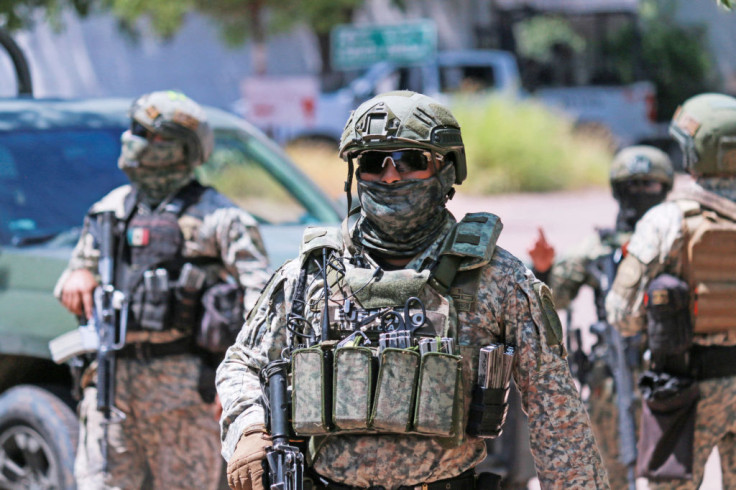
In just a few weeks, the brutal turf war between two rival factions of the Sinaloa Cartel — Los Chapitos, led by the sons of Joaquín "El Chapo" Guzmán, and La Mayiza, aligned with the son of Ismael "El Mayo" Zambada — will mark its first full year on Sept. 9.
What began as internal disputes in Culiacán has escalated into one of the deadliest cartel conflicts in recent Mexican history, leaving more than 1,800 people dead and a similar number missing or kidnapped, according to data from Noroeste. Yet despite the staggering toll of fatalities, neither side had secured a decisive advantage — until now.
According to a new report from CrashOut, sources within La Mayiza said they are confident they will achieve victory by the end of the year. A former member of El Mayo Zambada's security team told the outlet that a win by the faction led by Ismael Zambada Sicairos, also known as "Mayito Flaco," would mark a new phase in the cartel's evolution.
"A new map of the cartel is being drawn," the source said.
Local sources in Sinaloa report that La Mayiza has gained strategic territory both in rural areas and within Culiacán itself, a city long considered a stronghold of the Guzmán family. The report also points to a series of high-profile arrests by federal forces targeting Los Chapitos, which may have weakened their operational structure.
La Mayiza has also allegedly gained support from criminal cells that once aligned with Los Chapitos, including one of their armed groups known as Los Ninis, according to CrashOut.
Meanwhile, Los Chapitos have entered into a reported alliance with the Cártel Jalisco Nueva Generación (CJNG), although the partnership has mostly played out in violent clashes along the mountainous border region between Zacatecas and Durango.
In May, the U.S. Drug Enforcement Administration confirmed in its 2025 National Drug Threat Assessment that Los Chapitos and CJNG had struck an alliance. The DEA suggested that the alliance may be an effort by CJNG leader Nemesio "El Mencho" Oseguera Cervantes to expand his organization's influence into parts of Sinaloa.
"A strategic alliance between CJNG and Los Chapitos has the potential to expand these groups' territories, resources, firepower, and access to corrupt officials," the DEA report noted. "This could significantly disrupt the existing balance of criminal power in Mexico and increase northbound drug flow and southbound weapons trafficking at the U.S.-Mexico border."
Video showing members of CJNG and Chapitos operating in El Rosario, Sinaloa
— All Source News (@All_Source_News) June 9, 2025
Source: @crux1469 pic.twitter.com/CRBOHhT7rA
The conflict, which has claimed nearly 2,000 lives over the past 11 months, has also pushed both factions to adopt more aggressive recruitment strategies. According to authorities, cartels have begun luring adolescents with fake job offers or abducting vulnerable individuals, including those in rehabilitation centers, to be trained and sent into combat.
Earlier this week, Jalisco Attorney General Salvador González de los Santos said criminal groups were specifically targeting teenagers in Jalisco and moving them to other parts of the country.
"Some of the young people who were rescued and managed to return have identified others who are still in Sinaloa and have been reported missing," González said. "These criminal groups are taking youths and sending them to fight in the cartel war in Sinaloa."
Jalisco officials said the information came from testimonies of minors who had previously been recruited and who also identified possible locations of other missing individuals.
Earlier this month, Mexico's Secretary of Defense Ricardo Trevilla Trejo said the Sinaloa Cartel is rapidly losing power, territory and influence across the country due to the internal conflict between Los Chapitos and La Mayiza.
Officials said the ongoing civil war has weakened the organization to the point that it has lost control of 30 out of the 42 trafficking routes and distribution hubs it once dominated.
On July 25, Mexican President Claudia Sheinbaum said one of the priorities of her administration is to bring peace to the communities of Sinaloa, which have spent the last 11 months caught in the crossfire.
"We are working to bring peace to Sinaloa, and that is going to happen," Sheinbaum said. "We are working every day. And when there is honesty, strategy and hard work, there are results — in Sinaloa and across the country. So of course, Sinaloa will be pacified."
© 2025 Latin Times. All rights reserved. Do not reproduce without permission.






